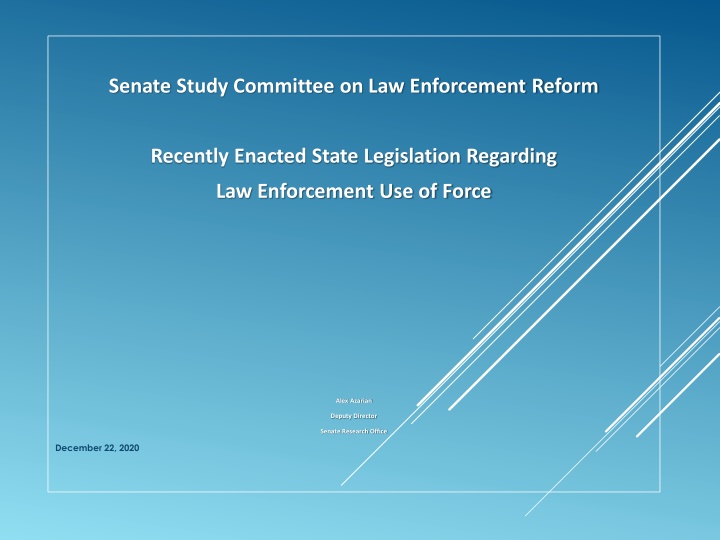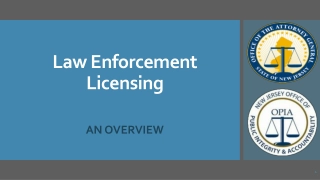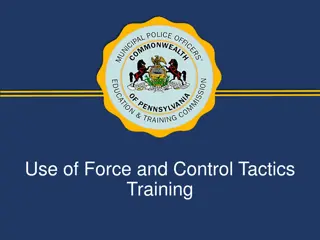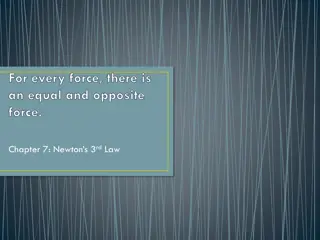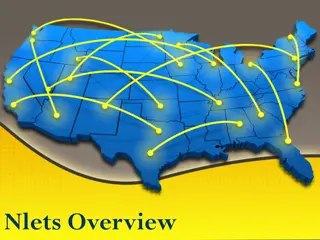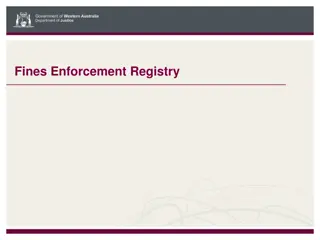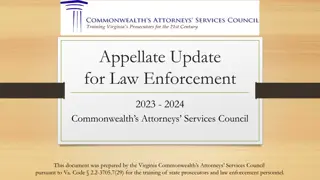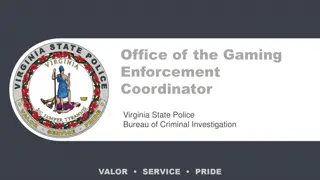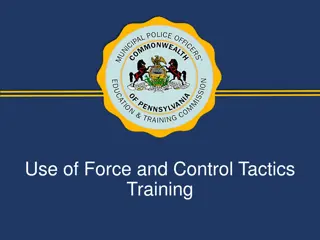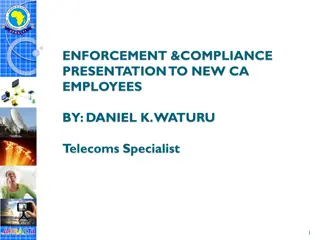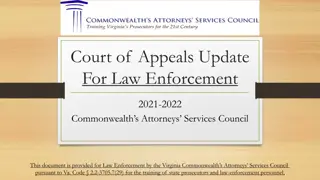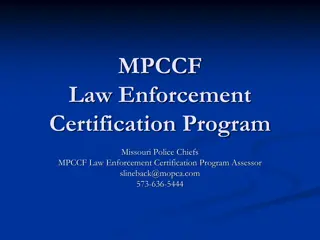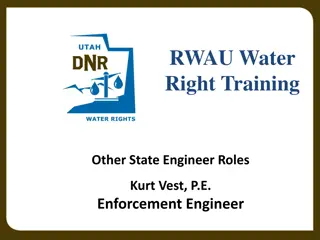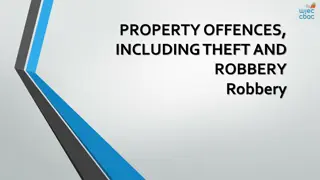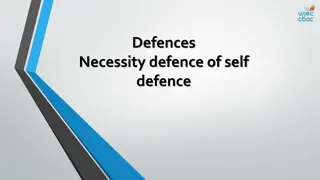2020 State Legislation on Law Enforcement Use of Force: Impact & Trends
The Senate Study Committee on Law Enforcement Reform highlights legislation enacted by 14 states in 2020 regarding law enforcement use of force. Common themes include restricting chokeholds, requiring peace officers to intervene and report excessive force, bodycams, and managing demonstrations. Specific details on state actions such as New Hampshire's prohibition of chokeholds, and requirements for reporting excessive force in multiple states are outlined. Additionally, Colorado and New Mexico implemented statewide bodycam mandates. These legislative developments aim to enhance accountability and address concerns about law enforcement practices.
Download Presentation

Please find below an Image/Link to download the presentation.
The content on the website is provided AS IS for your information and personal use only. It may not be sold, licensed, or shared on other websites without obtaining consent from the author.If you encounter any issues during the download, it is possible that the publisher has removed the file from their server.
You are allowed to download the files provided on this website for personal or commercial use, subject to the condition that they are used lawfully. All files are the property of their respective owners.
The content on the website is provided AS IS for your information and personal use only. It may not be sold, licensed, or shared on other websites without obtaining consent from the author.
E N D
Presentation Transcript
Senate Study Committee on Law Enforcement Reform Recently Enacted State Legislation Regarding Law Enforcement Use of Force Alex Azarian Deputy Director Senate Research Office December 22, 2020
BACKGROUND: 2020 STATE ACTION The following 14 states adopted legislation in 2020 addressing various aspects of law enforcement s use of force: California Colorado Connecticut Delaware Hawaii Iowa Nevada New Hampshire New Mexico New York Oregon Utah Vermont and Virginia 1 Senate Research Office
MOST COMMON THEMES Most of the legislation adopted by these states in 2020 share some common themes: 1. Restricting the Use of Chokeholds; 2. Peace Officer s Duty to Intervene and Report Excessive Use of Force; 3. Bodycams; and 4. Demonstrations and Civil Disturbances: Use of Force. 2 Senate Research Office
RESTRICTING CHOKEHOLDS Twelve States adopted legislation restricting the use of chokeholds. New Hampshire HB 1645 prohibits the use of chokeholds by law enforcement officers, except in circumstances in which a law enforcement officer is justified in using deadly force when he or she reasonably believes such force is necessary to defend himself/herself or a third person from what he or she reasonably believes is the imminent use of deadly force. 3 Senate Research Office
PEACE OFFICERS DUTY TO INTERVENE AND REPORT EXCESSIVE USE OF FORCE Colorado, Connecticut, Nevada, New Hampshire, New York, Oregon, Vermont, and Virginia all adopted legislation requiring a peace officer to intervene and report when witnessing another officer using illegal or excessive force. Connecticut House Bill 6004 requires any officer, while in his or her law enforcement capacity, to intervene and attempt to stop another peace officer from using force that the witnessing officer objectively knows is unreasonable, excessive, or illegal, unless the witnessing officer is operating in an undercover capacity at the time. Any peace or corrections officer who fails to intervene may be prosecuted and punished for the same acts as the officer who used unreasonable, excessive, or illegal force. The bill also requires any officer who witnesses, or is otherwise aware of, another police officer using illegal force, to report the incident to the law enforcement unit that employs the officer who used the force. 4 Senate Research Office
STATEWIDE USE OF BODYCAMS In 2020 Colorado and New Mexico adopted a statewide bodycam mandate. Connecticut expanded their current law to include all state and local agencies. And Vermont adopted a bill that requires all of its state DPS officers to be equipped with bodycams. New Mexico Senate Bill 8 requires peace officers who routinely interact with the public to wear a body camera while on duty. Agencies are required to develop policies and procedures governing the use of these cameras, including: Requiring cameras be activated during calls for service or other law enforcement or investigative encounters between the officer and a member of the public; Prohibiting deactivation of cameras until the end of the encounter; Prohibiting the recording of general activity; Requiring videos to be retained by agencies for at least 120 days; and Establishing disciplinary rules for officers who fail to operate their cameras in accordance with these policies or who manipulate or prematurely erase video recordings. 5 Senate Research Office
USE OF FORCE DURING DEMONSTRATIONS AND CIVIL DISTURBANCES Colorado, Connecticut, and Oregon all adopted legislation restricting or clarifying law enforcement s use of force when dealing with crowds, demonstrations, and civil disturbances. Connecticut House Bill 6004 Requires POST, in consultation with other specified law enforcement state agencies and organizations, to adopt a uniform statewide policy for crowd management by peace officers. The policy must also establish guidelines for managing crowds in a manner that does the following: Protects individual rights and preserves the peace during demonstrations and civil disturbances; Addresses permissible and impermissible uses of force by an officer and the type and amount of crowd management training that each officer must undergo, and Sets forth required documentation after any physical confrontation between an officer and a civilian during a crowd management incident. 6 Senate Research Office
QUESTIONS 7 Senate Research Office
